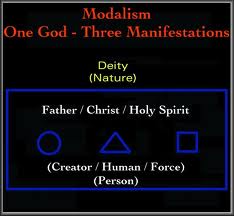Answering Trinitarian Objections II (Philippians 2:6-8)


Modalism's Reply to Philippians 2:6-8
(Philippians 2:6-8)
I. The Challenge to Holy Scripture Brought by the Trinitarian Presentation of Philippians 2:6-8
The Trinitarian understanding of Philippians 2:2-8 presents Christians with three basic challenges. First, the radical monotheism of the Bible is challenged by the introduction of the plurality of Persons concept; secondly, the willingness of Trinitarianism to accept the idea of a person of God ‘divesting’ Himself of His deity brings into question the biblical teaching of the incarnation; thirdly, the integrity of the ‘immutability’ of God is brought into dispute.
A. Denies the Radical Monotheism of Scripture.
First, there is verse 6 which seems to place Jesus as another person of God Who was equal with God; i.e. “Who, being in the form of God, thought it not robbery to be equal with God.” This presents a theological problem in view of the many Scriptures which show clearly that this equality of another person with God is an impossibility. Notice the following scriptures carefully.
- Exodus 8:10, “That thou mayest know that there is none like unto the Lord our God.”
- In Exodus 15:11 Moses sings out this question, “Who is like unto thee, O Lord, among the gods?” To this own question Moses gives the answer, “There is none like unto the God of Jeshurum” (a symbolic name for Israel, means upright). (Deuteronomy 33:26.)
- Furthermore, David declared in 2 Samuel 7:22, “Wherefore thou art great O Lord God for there is none like thee,”
- Then there is 1 Kings 8:23, “... Lord God of Israel, there is no God like thee, in heaven above, or on earth beneath.”
- The Psalmist asked, “For who in the heaven can be compared unto the Lord?” Psalms 89:6.
- Isaiah asked a like question, “To whom will ye liken unto God?” Isaiah 40:18. 55
- The LORD God asked the same question Himself, “To whom will ye liken me, and make me equal, and compare me, that we may be like?” Isaiah 46:5.
- Finally the scribe concurs with Christ when he says, “Well, thou hast said the truth: for there is one God; and there is none other but he:” (Mark 12:32).
B. A Person of God divesting (Emptying) Himself of Deity Denies the Incarnation.
The second challenge presented by the pluralist view is to the integrity of Yahweh Himself, and is found in verses 7-8, “But made himself of no reputation, and took upon him the form of a servant, and was made in the likeness of men: And being found in fashion as a man, humbled himself, and became obedient unto death, even the death of the cross.” It is alleged the pluralists that the second person of God, i.e. Jesus Christ, “emptied” Himself of His deity in order to live and die as a man. Thereby, temporarily, becoming inferior to the Father. The theological problem with this interpretation is that Colossians 2:9-10 teaches that just the opposite is true: “For in him (Jesus Christ) dwelleth all the fulness of the Godhead bodily. And ye are complete in him, which is the head of all principality and power.”
Paul’s statement as it appears in English is: “But make himself of no reputation...” This statement in the Greek is: all eauton ekenosen. While the pluralists want to interpret this as “poured out (or empitied) himself” (and by that implying that the second person of the Godhead emptied Himself of deity in order to suffer as a man) the testimony of holy Scripture just will not allow it. The word ekenisen is kenoō (Strong’s #G2758) from #G2756; to make empty, i.e. (figuratively) to abase, neutralize, falsify:-make (of none effect, of no reputation, void), be in vain. Although the root of this Greek word (kenos) has as one of its meaning “to make empty,” our word “kenoō” is never so translated in the New Testament.
Kenoō is used four other times in the New Testament and that by the same writer, Paul:
• Romans 4:14 “...faith is made void.”
• 1 Corinthians 1:17 “...lest the cross of Christ should be made void.”
• 1 Corinthians 9:15 “...should make my glorying void.”
• 2 Corinthians 9:3 “...lest our boasting of you should be in vain.”
In our text (Philippians 2:7) kenoō is used in the same context as its other uses and is so translated by the KJV translators as “no reputation.”
Not only does the “divesting” interpretation go counter wise to Colossians 2:9-10 but it also is a denial of the incarnation of the Mighty God in Christ. In this understanding of Philippians 2:2-8, which takes the imagined second person of Deity and empties him of his God-ness, we do not have Yahweh God manifest in flesh, as 1 Timothy 3:16 would teach. But instead, we have a God that has divested (emptied) himself of His deity in order to BECOME human. The problem exists in the fact that the Scripture states: “To wit, that God was in Christ reconciling the world unto himself” (2 Corinthians 5:19). Now the question, simply put, is: Was Jesus Christ God IN man, or was Jesus Christ God BECOME man? For the integrity of the incarnation to remain intact, it must be admitted that Jesus was God IN man.
C. Does Violence to the Immutability of God
Another part of this problem is that if Jesus, as God, divested Himself of Deity in order to become a man it would require a change in the nature of God. I.e. God gave up what He was in order to become what He was not. Which is to say that God, who is not, and was not, human, became human - something that He was not before! This presents a problem of some magnitude, because the Word of God states emphatically, “Every good gift and every perfect gift is from above, and cometh down from the Father of lights, with whom is no variableness, neither a shadow of turning.” (James 1:17). Furthermore, God says of himself. “For I am the LORD, I change not” (Malachi 3:6). So, not only is the emptying or divesting interpretation of Philippians 2:6-8 a denial of the incarnation of the Mighty God in Christ, but it is, in the same instance, a rejection of the immutability (the impossibility of change) of God; which doctrine is taught clearly in Scripture.

II. The Interpretation of Philippians 2:6-8 by Oneness (Modalistic) Theology
Having stated the challenges of the text as understood by the pluralists, such as the Trinitarians, I will attempt to show that, although the text presents challenges that need addressed, there is no problem with the text. The perceived difficulty for Oneness theology exists only when a wrong interpretation is forced upon the passage in order to arrive at a pretext (a purpose or motive alleged or an appearance assumed in order to cloak the real intention or state of affairs). When rightly divided, the meaning is harmonious with other scripture, and its message is edifying.
A. The Context Is Humility.
First and foremost, we must not make the mistake of attempting to force a meaning onto the passage which the writer did not intend. What then did the writer intend to teach by Philippians 2:6-8? The answer may be found in the verses 3 and 4. When we approach the text in this manner we are studying and interpreting by context. (A text without context is a pretext.) The question, then, is: “What is the context of the passage?” The subject is introduced clearly in verse 3, “...in the lowness of mind let each esteem other better than themselves.” The topic is humility. Not to insist on one’s own importance; but, to always prefer others before one’s self. Paul writes in verse 4, “Look not every man on his own things, but every man also on the things of others.”
In order to bring this truth home to his readers Paul directs them to Christ their Great Example as a model for the correct way to think of one’s self. Notice verse 5, “Let this mind be in you that was also in Christ Jesus.” Then verse 8 says, “he (Jesus) humbled himself.” That is the whole point! Paul is teaching the Philippians about humility by employing the master example: the Creator of the universe “appearing” as a mere man.
It does not follow that one loses his importance by assuming an inferior image; nor does one lose his superiority by projecting an inferior attitude. Counter-wise, however. One is proven even more important and more superior by his or her unassuming character.
B. Jesus Did Not Cease To Be God Because He Appeared As A Man.
So, now we face the text in its proper context. (This will avoid the pretext of the pluralists.) That is, although Jesus was All Important, All Superior, All God, because He was the Almighty (Revelation 1:8), He did not display His importance, His superiority, His deity, before men. Instead, He appeared as a servant. This, however, did not lessen His importance, His superiority, His deity; but rather, exalted it. Notice the spiritual principle of holy Scripture, “So the last shall be first and the first last,” (Matthew 20:16). The Christian gets by giving (Luke 6:38); Lives by dying (Colossians 2:20); Is exalted by being abased (Matthew 23:12).
C. The Scholars Explain.
In commenting on Philippians 2:6 (“Who being in the form of God thought it not robbery to be equal with God.”) Joseph Henry Thayer explains: “Who, although (formerly when he was Logos) he bore the form (in which he appeared to the inhabitants of heaven) of God (the Sovereign). Yet did not think that this equality with God was to be eagerly clung to or retained...” Adam Clark shares the following insight: “Who being in the form of God did not think it a matter to be earnestly desired to appear equal to God. But made himself of no reputation. Though he was from eternity in the form of God ... yet he thought it right to veil this glory and not to appear with it among ...men. He ... took upon ... the form or appearance of a servant.”
To all of this I can add very little except to say that Jesus was God (in being and form) from eternity. When it became necessary for God to come into our world He, in His wisdom, thought it not good to appear unto men as God. So He humbled himself and appeared as a man - in the form of a man; all the while remaining God in being. Thus, 1 Timothy 3:16, “...God was manifest in flesh.”
D. Why did He Not Just Say So?
Many times the question is asked, “If Jesus was Father God why did he not just say so?” The answer to this question is so completely summed up in Philippians 2:5-8. He was humble. He did not think it a good thing to flaunt His deity before men. He did not choose to appear better than other men, although He was better that all other men - for He was the creator of all men. He choose, instead, to have all men appear better that himself.
When Jesus spoke of the Father it was always in a way that distanced His own identify from that of the Father God. This action was in keeping with His character of not appearing as God - although He was. Concerning this very subject Jesus made the following promise, “These things have I spoken unto you in proverbs: but the time cometh, when I shall no more speak unto you in proverbs, but I shall shew you plainly of the Father.” (John 16:25). Paul referred to this same event of revelation when he wrote to Timothy, “Which in his times he shall shew, who is the blessed and only Potentate, the King of kings, and the Lord of lords; Who only hath immortality, dwelling in the light which no man hath seen, nor can see: to whom be honour and power everlasting. Amen.” (1 Timothy 6:15-16).
At the time of this great revelation may we all bow low at His feet and whisper in hushed tones of adoration the confession of Thomas, “The Lord of me and the God of me!”
Apostolically Speaking
☩ J L Hayes
Introduction to Modalism and Trinitarianism
- How Is God One?
Christians profess monotheism. But is it true. In this article "How Is God One" Bishop Jerry Hayes reviews the meaning of One God by looking at the NT Grk words translated "one." - Melchizedek and Elohim
This article investigates the mystery person of the Bible called Melchizedek. Here we consider the documents of Qumran, that, for the first time, gives extra-biblical information concern him. - Jesus Is Father God
From the 2nd cent. forward, Christians have debated the person of Jesus: Is he, or isn't He God? If He is God, is He the Father since the Bible makes clear that the Father is the only God there is? - Answering Trinitarian Objections I
We look at the plural pronouns of Ge 1:26; 11:17 & Is 6:8. Is one person of the Trinity actually speaking to another person/persons of the Trinity? This article gives the Modalist/Oneness answer.
An Exciting Debate On the Person of Christ








